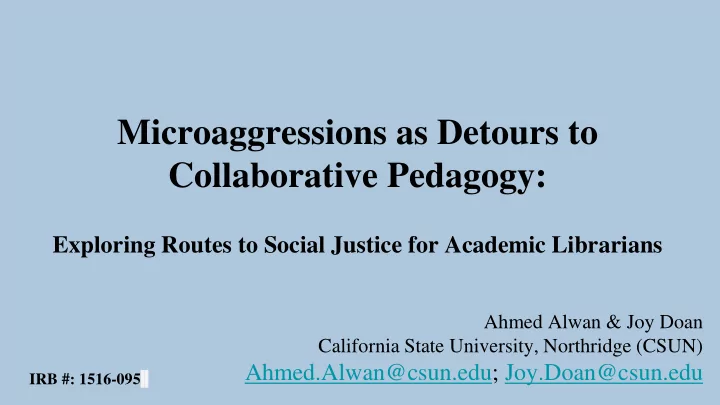

Microaggressions as Detours to Collaborative Pedagogy: Exploring Routes to Social Justice for Academic Librarians Ahmed Alwan & Joy Doan California State University, Northridge (CSUN) Ahmed.Alwan@csun.edu; Joy.Doan@csun.edu IRB #: 1516-095
Microaggression Defined Microaggressions are common and casual verbal, nonverbal, and environmental slights, snubs, or insults, either intentional or unintentional, that communicate hostile, derogatory, or negative messages to target persons based solely upon marginalized group membership. What differentiates microaggressions from overt and deliberate acts of discrimination, is that the people perpetrating microaggressions often intend no offense or are unaware they are causing harm (Wing Sue, 2010) .
Etymology & Evolution Dr. Chester Middlebrook Pierce (Pierce, 1970) “Most offensive actions are not gross or crippling. The enormity of the complication they cause can be appreciated only when one considers that these subtle blows are delivered incessantly. … the cumulative effect to the victim and victimizer is of an unimaginable magnitude. …the idea that [these] offensive mechanisms are usually a micro-aggression, as opposed to a gross, dramatic, obvious macro-aggression such as lynching.” Dr. Mary Rowe (Rowe, 1981) Micro-inequality: “... as destructive, but generally non-actionable, aspects of an environment which adversely affects the situations of minorities and women. They are the instances which reasonable people would agree are unjust towards individuals, by virtue of an individual being irrationally treated in a certain way only because of sex, race/ religion, age, or country of origin.”
Purpose of Study I. Academic Librarians express dissatisfaction about mistreatment they have endured at the hands of Teaching Faculty, who treat Librarians in an inferior manner, rather than as colleagues/partners. II. Symptomatic of worldviews filled with values, biases, assumptions and stereotypes embedded in the beliefs, attitudes and behaviours of the perpetrators. III. Little-to-no quantitative data exists on microaggressions from Teaching Faculty towards Academic Librarians.
Scope of Study Developed a survey to investigate North American Academic Librarians' experiences of status based microaggressions from Teaching Faculty. The survey attempted to address the following 3 points: I. How do Librarians walk line (or where to draw the line) between collegiality and assertiveness when communicating/collaborating with Teaching Faculty? II. Do Librarians believe they have the ability to speak from a place of power? III. Do Librarians feel comfortable and confident to report microaggressive behavior to their superiors, and is adequate support received?
The Survey Inclusive Dates: 10 February 2016 - 6 March 2016 Survey Platform: eSURV.org Distributed to the following Electronic Mailing Lists: • Association for Research Libraries–ARL • Association of College and Research Libraries– ACRL • Canadian Library Association—CLA • Library Association of University of California—LAUC • Music Library Association—MLA • Ontario Library Association—OLA • CSUN Oviatt Library • York University Scott Library
Assumptions of Inferiority The following survey questions aimed to demonstrate that Teaching Faculty may have poor understanding of Academic Librarians roles.
Assumptions of Inferiority continued
Assumptions of Inferiority continued
Assumptions of Inferiority continued
Assumptions of Inferiority continued
Strides Towards Effective Collaboration The following survey question aimed to quantifiably address current collective efforts among Teaching Faculty and Academic Librarians.
From M.L.I.S. → Trenches New MLIS graduates lack: I. Formal training in teaching and pedagogy. II. Skills to interact and collaborate with Teaching Faculty. III. Lack skills to properly assess instructional programs and efforts.
Practical Strategies I. Create partnerships with key stakeholders and learn to advocate. II. Enter diverse scholarly conversations. III. Advocate for self-empowerment and equity
Access To Our Data
References Alabi, J. (2015). Racial microaggressions in academic libraries: Results of a survey of minority and non-minority librarians. The journal ofacademic librarianship , 41 (1), 47 - 53. Doi: 10.1016/j.acalib.2014.10.008. Badke, W. B. (2005). Can't Get No Respect: Helping Faculty to Understand the Educational Power of Information Literacy. Reference librarian , 43(89/90), 63-80. Doi:10.1300/J120v43n89 05 . Bailey, E. (2010). Educating future academic librarians: An analysis of courses in academic librarianship. Journal of Education for Library and Information Science , 51 (1), 30-42. Christiansen, L., Stombler, M., and Thaxton, L. (2004). A report on librarian-faculty relations from a sociological perspective. The journal of academic librarianship , 30 (2), 116-121. Ishimura, Y. , & Bartlett, J. (2011). Information literacy courses in LIS schools: Emerging perspectives for future education. Education for Information , 27 (4), 197-216. Pierce, C. (1970). Offensive mechanisms. In Barbour, F.B. (Ed.), The black seventies (pp. 265-182). Boston, MA: Porter Sargent Publisher. Rowe, M. (1981). The minutiae of discrimination: The need for support. In B. L. Forisha & B H. Goldman (Eds.), Outsiders on the Inside: Women & Organizations (pp. 155-170). Englewood Cliffs, NJ: Prentice-Hall. Sproles, C. , Johnson, A. , & Farison, L. (2008). What the teachers are teaching: How MLIS programs are preparing academic librarians for instructional roles. Journal of Education for Library and Information Science , 49 (3), 195-209. Sue, D.W. (2010). Microaggressions and Marginality: Manifestation, Dynamics, and Impact . Hoboken, N.J.: Wiley.
Recommend
More recommend